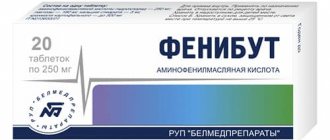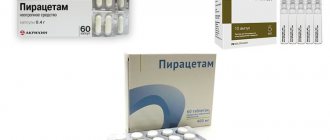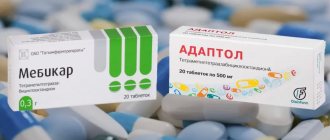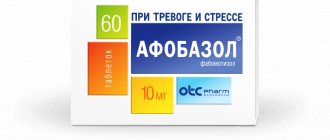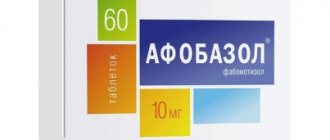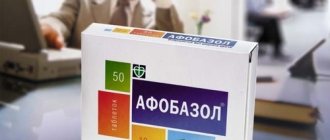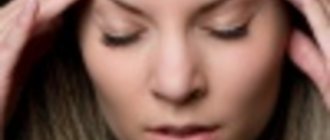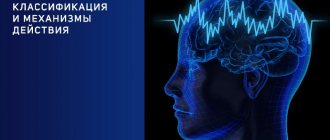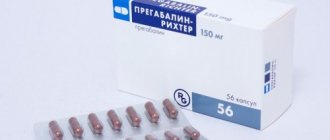Update date: 09/17/2020 15:31:12 8530 Share:
Author: Maria Feldshtein
*Review of the best according to the editors of simplerule.ru. About the selection criteria. This material is subjective in nature, does not constitute advertising and does not serve as a purchase guide. Before purchasing, consultation with a specialist is required.
In modern medicine, neuroses and the consequences of stress are treated not only with psychotherapy. Medications that can relieve anxiety and fear, improve mood, normalize sleep and return a person to normal life come to the rescue. These are drugs from the group of anxiolytics, and today we will compare two such drugs - Adaptol and Afobazol. What is the difference between them, read the article.
| The drug and its characteristics | Adaptol | Afobazole |
| Pharmacological group | Anxiolytic | Anxiolytic |
| Active substance | Tetramethyltetraazabicyclooctanedione | Fabomotizol |
| Release form | Pills | Pills |
| Manufacturer | OlainFarm (Latvia) | OTCPharm (Russia) |
| Price | 600-700 rub. | 250-350 rub. |
| Vacation at the pharmacy | On prescription | Over the counter |
Indications for prescribing anxiolytics
According to the official instructions, the drugs Adaptol and Afobazol are prescribed for the treatment of anxiety conditions and neuroses accompanied by irritability, anxiety and fear. These anxiolytics are used only in adult practice. For children under 18 years of age with similar symptoms, other remedies are recommended.
For other indications, anxiolytics differ.
Adaptol is recommended in the following situations:
- cardialgia (pain in the heart) not associated with ischemic heart disease and other organic causes;
- nicotine addiction – in complex therapy as a means of reducing cravings for tobacco;
- when taking antipsychotics and tranquilizers - to improve their tolerability.
Afobazole is prescribed for the following conditions:
- in complex therapy of various somatic diseases - for example, bronchial asthma, irritable bowel syndrome, arrhythmia;
- dermatological and oncological diseases;
- premenstrual syndrome;
- alcohol withdrawal;
- cardiopsychoneurosis.
Indications for therapy are determined by the doctor after examining the patient.
Information about Afobazole
The medication is intended to eliminate anxiety conditions. The active component of Afobazole, morpholinoethylthioethoxybenzylimidazole dihydrochloride, has the following effects:
- normalizes the functioning of the autonomic nervous system;
- reduces nervous tension;
- eliminates anxiety;
- improves sleep.
Afobazole is prescribed to patients with increased anxiety, irritability or a slight tendency to depression.
Taking Afobazole does not cause drowsiness and does not affect mental activity, so taking the medicine is allowed before an exam or before an important event.
In addition to the treatment of nervous disorders, the use of Afobazole is indicated in the following cases:
- quitting smoking (to reduce the severity of withdrawal symptoms);
- relief of menopausal symptoms (in women);
- problems with memory and attention caused by increased nervous activity;
- chronic sleep disorder (Afobazole is prescribed as an additional drug to therapy with sleeping pills).
Afobazole is not addictive, acts mildly, has the ability to accumulate in the body, and the effect of treatment is visible within 4-5 days. Due to the cumulative effect, the sedative effect of the drug continues a week after discontinuation of the drug.
The drug is available in pharmacies without a prescription and is approved for use from the age of eighteen. Contraindicated: in case of intolerance to the components included in the tablet, as well as in pregnant and lactating women.
But before you compare Adaptol and Afobazol in terms of their effect on the body and effectiveness, it is worth familiarizing yourself with the characteristics of the second medicine.
How do anti-anxiety medications work?
In the medical literature, anxiolytics are also known as tranquilizers. By influencing the central nervous system, they relieve or reduce the severity of anxiety, restlessness, fear and emotional stress.
The mechanism of action of anxiolytics has not been fully elucidated. It is assumed that they reduce the excitability of the subcortical centers of the brain (hypothalamus, thalamus and limbic system). At the cellular level, the effect of different drugs is different, and we will talk about this in more detail.
Adaptol
The drug works through the emotiogenic zones of the hypothalamus. The chemical composition of Adaptol is similar to the body's natural metabolites - its molecule consists of two urea fragments. Once in the body, it affects all major neurotransmitter systems: GABA-, choline-, serotonin- and adrenergic. The drug harmonizes their work and thereby reduces anxiety, worry and fear, and eliminates internal tension.
What you need to know:
- The calming effect of Adaptol is not accompanied by side reactions characteristic of other similar drugs, such as muscle weakness and impaired coordination of movements.
- It does not reduce mental and motor activity, so it can be prescribed during the day.
- Does not cause drowsiness, but enhances the effect of sleeping pills.
- Improves mood, but does not lead to euphoria.
- It has a nootropic effect: improves attention and memory, stimulates mental performance.
Afobazole
Afobazole binds to sigma-1 receptors in brain cells, stabilizes the functioning of GABA receptors and restores their sensitivity to mediators - special substances that trigger inhibition processes in the nervous system. It also acts as a neuroprotector: it reduces the permeability of nerve cell membranes, increases their stability and accelerates recovery.
Afobazole works both as an anti-anxiety and a stimulant drug. It reduces or completely eliminates anxiety, relieves emotional tension and irritability, and normalizes sleep. The drug also removes somatic manifestations of anxiety (rapid heartbeat, upset bowel movements, muscle weakness, feeling of shortness of breath, etc.). At the same time, it improves attention and memory.
The effect of the drug is observed after 5-7 days from the start of therapy, reaches a maximum in the 4th week and persists after completion of the course for two weeks.
According to the instructions, Afobazole is most effective in people with asthenic character traits, prone to suspiciousness and anxiety, and emotional lability.
Description of the drug Afobazol
The anxiolytic drug Afobazol contains fabomotizole. Available in tablet form. The manufacturing company is located in Russia. The product is available without a prescription.
Afobazole is a selective non-benzodiazepine anxiolytic. Affects receptors on nerve cells in the brain. The drug increases the energy potential of neurons, restores and protects brain cells. Its action is due to a combination of mild stimulant and anxiolytic effects.
Afobazole copes with anxiety disorders, irritability, tension, and some cognitive impairment.
The effect of using the product develops on days 5-7 of treatment. The maximum result appears at the end of the month of therapy and lasts for about 2 more weeks. The drug does not lead to drowsiness, muscle rigidity, and does not negatively affect concentration and memory. The treatment does not lead to addiction and does not result in drug withdrawal syndrome.
Research and effectiveness
Afobazole, which was developed not so long ago, has a high safety profile in comparison with its analogues. Research shows that the product is almost completely devoid of such disadvantages as a large list of adverse reactions that occur quite often.
The product can be used effectively for anxiety disorders of various types. The evidence base for the drug is insufficient, so it still cannot be recommended as the drug of choice in the treatment of anxiety disorders.
Source:
Gorodnichev A.V. Current trends in the treatment of anxiety disorders: from scientific data to clinical recommendations. Socio-political thought. 2012.
Contraindications
The drug Afobazol cannot be used for treatment of:
- hypersensitivity to the composition;
- galactose intolerance;
- pregnancy;
- breastfeeding.
Afobazole is not used in the treatment of children and is contraindicated for use before the age of 18. When it is necessary to carry out treatment during lactation, you need to temporarily stop breastfeeding until the drug is completely removed from the body.
Side symptoms
Possible side effects from taking Afobazole are minimal - allergies and headaches. The symptoms go away on their own and do not require discontinuation of the medication. If other symptoms occur, you should stop using the drug and consult a doctor.
Dosage
The medicine is taken after meals. A single effective dose is 10 mg, per day – 30 mg. The course lasts up to 4 weeks, after which, if necessary, it can be continued or repeated after some time. The dose can be increased to 60 mg on the recommendation of a doctor.
An overdose of Afobazole is accompanied by drowsiness, the development of a sedative effect is possible, but without the manifestation of muscle relaxation. For treatment, caffeine is injected subcutaneously.
To whom is it assigned?
The medicine is used for the treatment of anxiety conditions, including generalized anxiety disorders.
Afobazole is prescribed for systemic pathologies such as ischemic heart disease, lupus erythematosus, arrhythmia, hypertension, and some skin diseases. Indications will also include withdrawal syndrome, PMS, menopause, and neurocircular dystonia.
Assessing the effectiveness of drugs
The effectiveness of drugs is determined based on the results of clinical studies and practical experience of use.
Adaptol
From the perspective of evidence-based medicine, Adaptol remains a controversial drug. The Cochrane Library contains studies confirming the effectiveness and safety of anxiolytics. There are several articles on the drug in the medical database PubMed, but none of them contain information about large placebo-controlled studies. One of them indicated that Adaptol is effective in asthenoneurotic syndrome against the background of muscular dystonia, but the sample of patients was small, and we cannot rely on these data.
In Russian-language literature, Adaptol is treated differently. Review articles indicate that the drug is used for. Clinical trials have shown that in the second week of therapy, patients’ anxiety decreases and concomitant autonomic disorders go away. Adaptol is also used in some other areas of medicine.
Afobazole
Afobazol, like Adaptol, does not have a serious evidence base. There is no mention in PubMed or the Cochrane Library that placebo-controlled studies have been conducted for the drug. And only in Russian-language literature can you find information about the drug:
Afobazole for neuroses associated with anxiety. A clinical study showed that the effect of the drug develops slowly, with improvement observed by the end of the 4th week of treatment. There are practically no side reactions.
Afobazole itself and for generalized anxiety disorders. The review article shows that long-term use does not reduce the effectiveness of the drug and does not increase the risk of adverse reactions.
What is the difference
Having familiarized ourselves with the similarities, let's see what the difference is between the medications:
- Speed of action. The calming effect of Adaptol is observed after half an hour, and for Afobazol to work it takes several days;
- Age. Adaptol is approved for children over 10 years of age, and Afobazol is prescribed only to adults;
- Presence of somatic pathologies. It is not advisable to drink Adaptol if you have cardiovascular diseases or exacerbation of diseases of the digestive tract;
- Elimination rate. Afabozole is eliminated slowly and for a week after discontinuation of the medication, the calming effect on the body remains, and Adaptol is eliminated within a few hours;
- Dispensation at the pharmacy. Afabozole is available without a doctor's prescription, and to purchase Adaptol you need a prescription form.
For the treatment of severe nervous disorders, doctors may prescribe taking Adaptol and Afobazol together . This is based on the fact that the clinical compatibility of Afobazol and Adaptol has been proven and, when used together, the drugs enhance each other’s effects without affecting the patient’s psychophysical activity.
Application diagram
The treatment regimen for the drugs is similar:
- Adaptol is prescribed three times a day. The maximum single dosage is 3 g, daily dosage is 10 g. The drug should be taken orally regardless of food intake. The duration of therapy ranges from several days to three months and depends on the clinical picture.
- Afobazole is prescribed three times a day. The maximum daily dosage is 30 mg. The course of therapy is 2-4 weeks. If necessary, you can increase the duration of treatment to three months.
What to choose
Which medication to take is selected by the doctor individually and the choice depends on the degree of psychoneurological disorder and the characteristics of the patient’s body:
- Nature of the disorder . In acute stressful conditions, Adaptol is stronger, which will act within half an hour, and in case of prolonged neuroses and depression, Afobazol, which accumulates in the body and acts gently for a long time, will be more effective;
- Presence of somatic diseases . In case of cardiac pathologies or exacerbations of gastrointestinal diseases, it is better to choose Afobazole;
- Age . Afobazole is prohibited until the age of 18, and Adaptol can be prescribed to children from the age of ten;
- Features of work activity . If the patient drives a car or works with moving machinery, then preference should be given to Afobazole, which, unlike Adaptol, does not cause a decrease in blood pressure and a slight disturbance in concentration.
Afobazole belongs to a new generation of drugs, it acts more gently and has a long-lasting effect due to the cumulative effect. But Afobazole is not always better than Adaptol; the choice depends on the individual characteristics of the patient and some other factors. Despite the fact that Afobazol, unlike Adaptol, is sold in pharmacies without a prescription, there is no need to self-medicate - in some cases, taking Adaptol is indicated. Which medication to prescribe and whether it is necessary to take Afobazol and Adaptol together is determined only by the attending physician, taking into account the data of the examination and laboratory tests.
